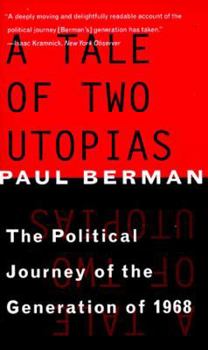A Tale of Two Utopias: The Political Journey of the Generation of 1968
Select Format
Select Condition 
Book Overview
The ideological passions that, along with critical acclaim, greeted the publication of Paul Berman's A Tale of Two Utopias showed how persistent are some of the battle lines drawn in the tumultuous years around 1968.
A Tale of Two Utopias recounts "in clean, clear, often funny style" (Washington Post) four episodes in the history of a generation: the worldwide student radicalism of the years around 1968; the birth of gay liberation and modern...
Format:Paperback
Language:English
ISBN:0393316750
ISBN13:9780393316759
Release Date:October 1997
Publisher:W. W. Norton & Company
Length:352 Pages
Weight:0.57 lbs.
Dimensions:0.9" x 4.6" x 7.4"
Customer Reviews
2 ratings
engaging essays!!!
Published by Thriftbooks.com User , 16 years ago
I had to read this for my modern American grad history course. Not knowing who Paul Berman was, I picked up the book expecting very little. Naturally, Berman's perspective revolutionized my intellectual outlook. Hard to classify, Berman believes that the ultimate legacy of '68 is not radical Leftist polemics (which ultimately descended into totalitarianism itself) but rather the rise of identity politics--a new means to express every aspect of who one is. Berman writes in the long tradition of great Americans like Daniel Bell who challenged dogma in favor of individualism and freedom. Finally, a true LIBERAL who eschews radicalism and shows some faith in mankind.
The legacy of 68
Published by Thriftbooks.com User , 16 years ago
This is probably the most optimistic of the Berman books I have read thus far for in it he imparts to the reader (by the wonderful flow of his writing as much as in the stories he tells) something of the spirit of 1968. "A utopian exhilaration swept across the student universe," he writes. "Almost everyone in my own circle of friends and classmates was caught up in it. ... Partly it was a belief, hard to remember today, that a superior new society was already coming into existence. And it was the belief that we ourselves--the teenage revolutionaries, freaks, hippies and students--stood at the heart of a new society." And the revolutionaries worked hard to create this new society. They held endless meetings, endless debates, marched, protested, sang, sometimes risked their lives all in the name of democracy and a better world. And then something went wrong. Somehow the idealists found themselves allied with terrorists; their democratic societies either disbanded or taken over by totalitarians until in 1972 (after the racism, the anti-Semitism, the assassination campaigns, and the kidnappings had gone un-commented because "you couldn't speak ill of the guerrillas") "there were Israeli corpses stretched out on the German soil." How did this happen? It happened, Berman explains because the idealists didn't "know the difference between democrats and totalitarians" and thus concluded that the totalitarians were "social democrats with courage"--and let the totalitarians take over their organizations. And once the totalitarians took over, the assassinations and the mayhem began and the drive for a liberal democracy (if it remained a goal at all) was put very much on the back burner. And the student movements that sparked the utopian exhilaration that spread across the globe either dissolved (the French chose to dissolve after the Munich massacre) or fragmented into tiny and ineffective splinters. (And anyone who reads the newspapers today knows that this left-wing naivete in the face of totalitarianism is part of the legacy left us by the `68ers.) And even so, things did change and for the better. Women and homosexual and ethnic minorities did achieve more social equality. And these groups are (even now) inspiring other minorities such as the disabled community) to follow suit. And those are just the legacies in the West. In Eastern Europe, there were the revolutions of 1989--revolutions Berman argues that were the direct descendants of the best of 1968. How did that happen if the 1968 movement itself was hijacked by the totalitarians? To answer that question, Berman turns to George Orwell and finds that Orwell describes Winston's progress from "left wing purity" to "personal integrity and private life". The left-wing purity did not survive the assault of the totalitarians. The democrats were too naïve and too poorly organized to withstand that assault. But something from 1968 did survive--and it was the belief that one must be true t






